Taking War Seriously: Modern War in Young Adult Literature
It was a striking statement that I still, nearly two months later, continue to ponder. It reminds me, first, that the young people in our society often bear the brunt of the military conflicts we engage in. And it suggests to me that war may be something that young people often think about, and not just in the abstract ways I did growing up at the tail end of the Cold War. These young people don’t have to be soldiers deployed to foreign countries to suffer the consequences of war (although some of them will find themselves there). Younger siblings watch older brothers and sisters deploy to combat zones; some wait at home anxiously, counting down the months of a high school friend’s deployment; children are caught in combat zones and suffer deprivations or even injury and death. At the very least, we all may see footage on newscasts and read newspaper and magazine reports.
Marshall George wrote recently on this blog about young adult literature dealing with World War II. In this post, inspired by my encounter with this young Air Force Academy cadet, I want to focus on more modern concerns about war as portrayed in young adult literature. We’re fortunate that many writers in the modern era of young adult literature have taken their readers seriously and demonstrated confidence in their abilities to handle complex representations of war. While they may not reach the same level of popularity as books written about orphaned wizards or hunky vampires, these writers and their books thoughtfully explore the complexities and ambiguities of war and its consequences for the young people caught up in it.
The Vietnam War in YA Fiction
| Many young adult authors have tackled war from the perspective of a soldier, although few have done so with the skill of Walter Dean Myers. His book, Fallen Angels, published in 1988 has arguably achieved the same status for young adults as Tim O’Brien’s The Things They Carried has for adults. Fallen Angels tells the story of Perry, a young man from Harlem who can’t afford college, so he enlists in the Army and is deployed to Vietnam. He and his platoon, a colorful and realistically drawn set of characters, confront the horrors of Vietnam and combat against the NVA and Vietcong forces. Throughout, Perry struggles to find redeeming qualities in himself and in his fellow soldiers at the same time as he questions the role of African-Americans in the Vietnam conflict and the US involvement in the war. Myers’ book is a masterful examination of the horrors of war and the impact that being a party to violence has on Perry, who narrates the story. The book mirrors the experience many have shared of war: long stretches of boredom punctuated by brief, adrenaline-filled bursts of combat. Myers’ writing throughout is honest and engaging, and in Perry he draws a bright young man who is acutely aware of his perilous place as an African-American in the Army and critically questions the value of war in general and the Vietnam conflict specifically. |
| Sunrise Over Fallujah follows Robin Birdy Perry, the nephew of the narrator of Fallen Angels, who enlists in the military after witnessing the events of 9/11. Deployed to Iraq, he’s assigned to the Civilian Affairs Battalion who are supposed to help secure and stabilize the country and win the hearts and minds of the Iraqi people. While his unit isn’t technically assigned to a combat role, Robin sees the horrors of war as his unit is attacked several times (including by the civilians whose hearts they’re trying to win) and is even given a dangerous, highly political assignment where he’s wounded. As the book ends, he’s headed to Ramstein in Germany to be treated for his injuries. Again, in Sunrise Over Fallujah, Myers draws realistic characters in settings that complicate simple attitudes about war, the soldiers who fight, and the civilians caught in the middle. Robin struggles to deal with the abrupt and seemingly senseless loss of fellow soldiers he’s become close to and is haunted throughout the book by the conflict he sees and feels between the altruistic mission of the Civilian Affairs Battalion and the violence in which that mission takes place. |
| Other writers broaden our perspective on war by focusing their narratives on the lives of those left behind or those trapped in the middle of conflicts. Dana Reinhart’s book The Things A Brother Knows looks at the experiences of a family waiting at home for a soldier son to return. After three years deployed to the middle east, Levi’s brother Boaz returns home, but he’s not the same. Boaz spends most of his time by himself in his room, walks anywhere when he does leave because he refuses to get into any car, and spends inordinate amounts of time online looking at maps. When Boaz announces that he’s leaving to walk the Appalachian Trail, Levi knows something’s up; using notes Boaz left behind, Levi figures that he’s headed to Washington, DC and decides to intercept Boaz on his walking trip. While Boaz isn’t happy at first to have his little brother tagging along, he grudgingly accepts him and the two visit the families of fellow soldiers still deployed and vets who returned before Boaz. They end up visiting one of Boaz’s closest friends, a fellow soldier who lost both legs in combat. Along the way, Levi comes to better understand the nature of Boaz’s experience as a soldier and learns that Boaz still cares deeply for him. |
| The Vietnam war is a popular topic for young adult literature, with most of the books about it being written from a Western perspective. One significant exception to this is Inside Out and Back Again, by Thanhhah Lai, a book that’s likely familiar to readers of this blog (but still worth a mention in this context). This is an autobiographical collection of prose poems that tell the story of Ha, a young girl living in Saigon when the war breaks out. Her father is fighting in the South Vietnamese army, and as the fighting threatens to overwhelm Saigon near the end of the war, Ha’s family must make the heart-wrenching choice to leave Vietnam for America. They resettle in Alabama, and Ha faces prejudice and bullying as she adjusts to her new life. |
The Vietnam War in YA Non-Fiction
| Boots on the Ground by Elizabeth Partridge takes a unique approach to a war that many young people may either be unfamiliar with or have simplistic interpretations of. Partridge organizes the book around people involved in the war, including regular, every day troops and central figures like JFK or LBJ. When she tells the story, for instance, of Mike Horan, a military advisor sent to Vietnam early in the conflict, it’s clear that she’s carefully interviewed Horan and captures his story in his own words, including his own doubts and concerns about the conflict’s early days. Her portraits of prominent figures like Johnson or Kennedy are drawn from primary sources (including White House audio tapes and even Kennedy’s own Dictaphone recordings). Together, these give the book a very real feeling, and Partridge does not gloss over the difficulties and self-doubt that soldiers and leaders alike faced in the Vietnam conflict. And the individuals she’s chosen represent some careful thinking: The book includes an interview with a protest singer, a nurse, and a Vietnamese refugee, thus striving to present a broader view of the war and its impact on many different people. |
| Russell Freedman’s book, Vietnam: A History of the War, similarly refuses to shy away from the complexities of this conflict and war in general. He begins the book with a succinct history of colonial conflicts in Vietnam that set the stage for Ho Chi Minh and the Communist uprising. In telling the story of the Vietnam war, Freedman incorporates many materials from primary sources, including communications between US government advisors and presidents as well as communiques from the North Vietnamese leaders. His treatment of the war shows the benefit of the decades that have passed and the clarity of hindsight; its greatest strength lies in Freedman’s ability to distill complicated events and political conflicts in a way that doesn’t overwhelm readers but still gives them a clear understanding. And he is unflinching in his critique of American policies and Communist totalitarian practices during and after the war. His final chapter is perhaps what draws me most to this book. Titled “Reconciliation,” Freedman begins the chapter with a description of a modern-day Vietnam with a thriving market-based economy and normalized relationships with the United States and then considers the war in retrospect, including quotes from many political and military leaders outlining why the US failed in Vietnam. He concludes the chapter by highlighting the ways that the two countries have overcome the mistrust and bitterness that were the natural fallout of the conflict in that country. (Freedman passed away earlier this year, leaving behind a considerable legacy of historical writing for young people.) |
Until next week.
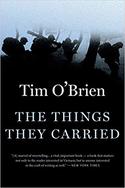
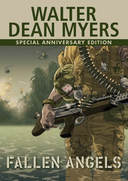
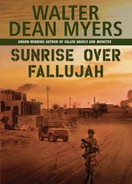
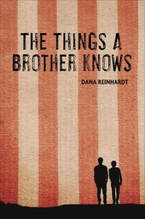
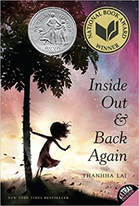
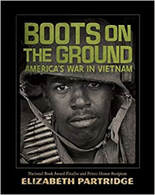
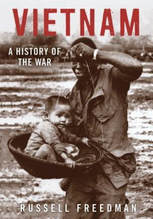

 RSS Feed
RSS Feed